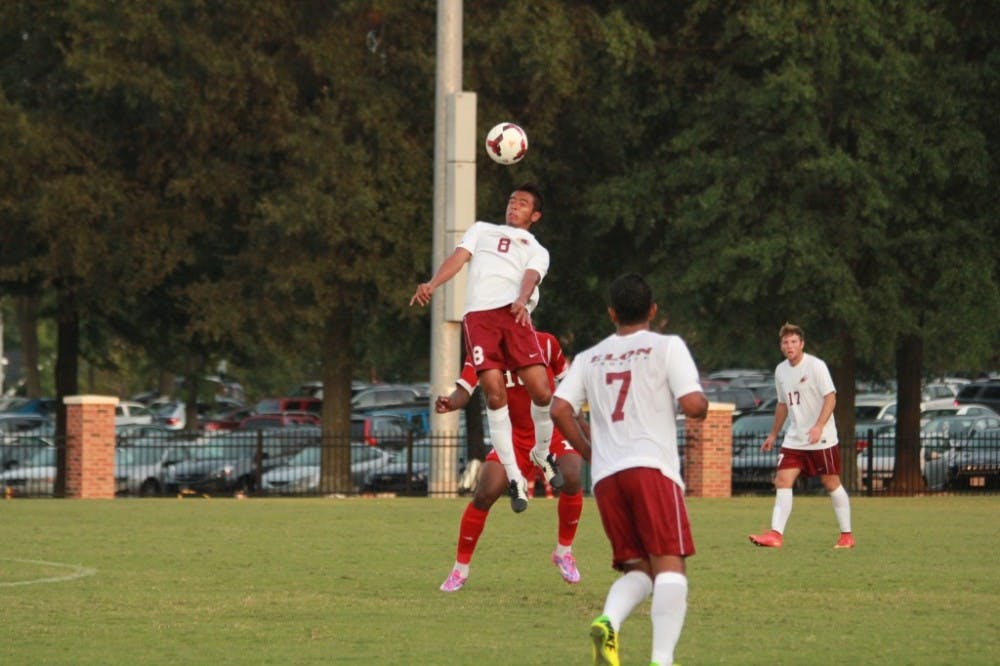Junior forward Miguel Salazar spent the majority of his first two years on the Elon University men’s soccer team as little more than a secondary offensive option behind the team’s headline-grabbing stars.
But that didn’t bother Salazar.
He knew his value was as a steady presence in the defensive midfield, where he would roam the field and disrupt the opponent’s possession to help Elon’s back four quell attacks on their final third.
“My priority has always been defense first and attacking second,” Salazar said. “My main job is to defend in the midfield, not to go forward. I don’t want to attack and be caught too high and not be able to recover in time to defend.”
He used his first two years to absorb as much as he could from the leaders in front of him, knowing that their experience was invaluable for a player still adjusting to the college game.
“Every day they came into practice and worked hard,” Salazar said. “Even if it wasn’t their best day, they always had the right mentality and the right attitude, and it showed the rest of us how they expected us to play.”
This year, Salazar has played second fiddle to no one. He scored two of the team’s four goals through its first three regular season games.
In 2012, his freshman year, he learned under the tutelage of then-senior forward Chris Thomas, the 2012 Southern Conference Player of the Year, who scored a nation-best 23 goals and was named a Hermann Trophy semifinalist, and then-senior midfielder Gabe Latigue, who supplied five goals and six assists that year. Together, Thomas and Latigue led the Phoenix to its second straight Southern Conference title and second consecutive berth into the NCAA tournament.
All the while, Salazar, still adjusting to the college game, fit nicely as a complementary piece in the midfield for his more recognizable teammates up front. He tallied 19 starts and was rewarded with a spot on the Southern Conference All-Freshman team.
In 2013, with a year under his belt, the Guanajuato, Mexico native started 20 games and tallied three assists. He was overshadowed by then-senior midfielder Daniel Lovitz — now a member of Major League Soccer’s Toronto FC — and then-junior forward Jason Waterman. Together, Lovitz and Waterman carried the team to a third straight conference title and first ever NCAA tournament win, while Salazar again contributed in the defensive midfield.
Salazar said his increased offensive production is because of his greater understanding of his role in the offense.
“I had to learn my role on the team,” Salazar said. “[As a freshman], I had to learn to go forward at the right times. I had to learn when to go [forward] and when to stay back [in midfield].”
Head coach Chris Little, who coached Salazar as a freshman in 2012 when he was an assistant under former coach Darren Powell, said he is not surprised at all that Salazar’s offensive potential is beginning to show. It is his commitment to his craft, Little said, that has allowed him to break out.
“He’s always had a lot of offensive talent,” Little said. “One of the things he worked on was getting forward and attacking, and he’s done a great job developing that part of his game. His two goals have been a testament to that hard work.”
His emergence has been vital, as most of Elon’s other weapons, other than juniors James Brace and Nathan Diehl, who scored the other two goals, have yet to find the back of the net.
While it’ll be tough for him to continue the pace he started the season with, Little said he hopes Salazar can remain a solid option in support of Waterman and Brace, should the two forwards need help.
“We’ve been looking for where we can get goals from. We can’t be reliant on our forwards,” Little said. “We’ve challenged our guys to produce, and Miguel has taken that challenge to heart and stepped up and given us what we needed.”


